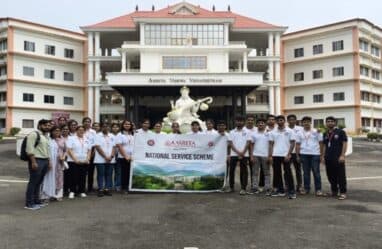Karnataka Revises Compulsory Rural Service for Medical Students Amid Controversies

Karnataka’s effort to make rural service mandatory for all medical students, including those in private colleges, has invariably ended up in court, with medical students labelling it a “lost year” and private students disputing its constitutionality.
In January 2024, the Karnataka government changed the Compulsory Rural Service Act to somewhat loosen it. With the new amendment, select deserving students are exempted from rural service, citing a scarcity of posts to accommodate all students graduating in a single year. Meanwhile, officials have denied students permanent registration with the state medical council, and students are blaming the government for failing to communicate the rules in advance.

Also Read: TS DOST 2024 Application Submission till 29 May 2024 For Phase 1, For UG Admissions in Telangana

MBBS Rural Service Bond: Few vacancies
The reason for mandated rural service is to improve the doctor-to-patient ratio in the region. According to the National Medical Commission, India has a doctor-to-patient ratio of 1:834, meaning one doctor for every 834 people. However, this figure conceals the unequal distribution of doctors and their scarcity in rural areas, as the majority prefer to work in cities.
However, the government has revised the Act to indicate that mandatory rural service is only required “in the existing vacancies as specified by the state government”. This was done to ensure that the state just hires the necessary number of doctors and does not have to create new positions when there are none. Students who do not complete their mandated rural duty are punished.

RGUHS and State-Wide Merit List
The government has now implemented a new counselling method that generates a state-specific merit list of students for position allocation. Furthermore, students who rank first or second on the state merit list will be able to opt out of rural service.
This merit list is being prepared by the Rajiv Gandhi University of Health Sciences (RGUHS), which serves as the nodal university for all medical colleges in Karnataka. Experts stated that the move assures that there are adequate doctors in rural areas, while the change also provides exemptions for a “significant number of students.”
“Overall, it is a good decision. This government’s posts are filled on a rotational basis. The only confusion the council will confront is that the current method requires them to wait for the results. Patil stated that deemed universities have various exams, as does RGUHS.

“So, if any students desire to register in the counselling cell, they have now made it possible for them to take other courses while also completing their rural posting. If students sign this bond, the cell will issue an NOC (no objection certificate), which will allow them to register with the Karnataka Medical Council,” explained Patil.

Karnataka Private Medical Colleges: No bonds signed
“When we attempted to obtain our permanent registration from the KMC, we were routed to the Bond Enforcement Cell. Previously, we were not required to obtain an NOC from the Bond Enforcement Cell, but this time it was implemented. They stated that they cannot issue a NOC until the applicant signs a bond. We had not filed an affidavit for any type of bond at the time of admission.
In April 2024, students from Kasturba Medical College, Manipal Academy of Higher Education, a private deemed-to-be institution, filed a writ suit in the High Court of Karnataka requesting relief from required rural service. They claim that the Karnataka Medical Council has “unduly denied the issuance of the NOC” for students who have declined.

Furthermore, the Karnataka High Court’s 2021 decision stated that students from the 2018-19 batch who are now filing for registration in 2024 will be eligible for required rural service.
‘Forced’ Rural Service
“Except for providing property and enabling students to study in Karnataka, the government has not granted any exemptions to these colleges. Either in the fees or in anything else. Now, asking them to do it is not acceptable. This has also been argued in the High Court. Students pay full fees in private colleges, and then this rule was implemented.
It resembles bonded labour. However, nothing can be done unless the Act is amended, according to Patil. “All private and government students are expected to do the rural service. If students don’t want to do it, it shows they aren’t interested in helping others,” said Madhushankar L, secretary of the Indian Medical Association (IMA), Bengaluru chapter.

Conclusion:
Karnataka’s attempt to mandate rural service for all medical students has faced significant legal and ethical challenges. The revised Compulsory Rural Service Act aims to balance the need for rural healthcare with the practical constraints of job availability and student rights. By exempting top-performing students and clarifying the criteria for mandatory service, the state hopes to address the doctor shortage in rural areas without overburdening graduates.
However, ongoing disputes and court cases highlight the need for clear communication and fair policies that consider the diverse circumstances of both government and private medical students. As the situation evolves, it remains crucial for the government, educational institutions, and the medical community to collaborate in ensuring equitable healthcare access while respecting students’ career aspirations.
Vani Jha is a creative content writer with over 2 years of experience in producing engaging, informative, and well-researched content across various domains. Her expertise lies in SEO, research, editing, and content and copywriting. With a proven track record in enhancing online presence and audience engagement, Vani excels in crafting compelling articles, blogs, and other written materials.






